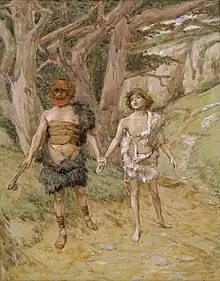Caïn et Abel (Genèse)
Dans le livre biblique de la Genèse, Caïn[note 1] et Abel[note 2] sont les deux fils aînés d'Adam et Ève[1]. Caïn, le premier-né, était fermier, et son cadet Abel était berger. Les deux frères ont accompli des sacrifices à leur Dieu, cependant ce dernier a préféré le sacrifice d'Abel plutôt que celui de Caïn. Jaloux, Caïn a assassiné Abel. Dieu l'a alors puni en le condamnant à une vie d'errance. Caïn s'est exilé dans la Terre de Nod (en hébreu : נוֹד), où il a fondé une ville et engendré une lignée de descendants, commençant par son fils Hénoch.
.jpg.webp)
Origines

Le plus ancien exemplaire connu du récit biblique provient des manuscrits de la mer Morte et est daté du premier siècle avant notre ère. Caïn et Abel apparaissent également dans un certain nombre d'autres textes, et ce passage fait l'objet de diverses interprétations. Abel, la première victime d'un meurtre dans la Bible, est considéré dans certaines interprétations comme le premier martyr ; tandis que Caïn, le premier meurtrier, est parfois vu comme un ancêtre du mal. Certains théologiens suggèrent que la péricope pourrait avoir été inspirée d'un récit sumérien représentant le conflit entre les bergers nomades et les agriculteurs sédentaires. Les chercheurs modernes considèrent généralement que les histoires d'Adam et Ève et de Caïn et Abel évoquent le développement de la civilisation au Néolithique ; ne contant pas les débuts de l'homme, mais le moment où la population a initié l'agriculture et s'est sédentarisée, remplaçant les habitudes du chasseur-cueilleur[2].
Annexes
Notes
- kaɛ̃; hébreu : קַיִן Qayīn, in pausa קָיִן Qāyīn; grec ancien : Κάϊν Káïn; arabe : قابيل/قايين (Qābīl / Qāyīn)
- a.bɛl; hébreu : הֶבֶל Heḇel, in pausa הָבֶל Hāḇel; grec ancien : Ἅβελ Hábel; arabe : هابيل (Hābīl)
Références
- Schwartz, Loebel-Fried et Ginsburg 2004, p. 447.
- Kugel 1998, p. 54–57.
Bibliographie
- Robert Alter, The Five Books of Moses: A Translation with Commentary, W. W. Norton & Compan, (ISBN 9780393070248, lire en ligne)
- Francis Brown BDB, Samuel Rolles Driver et Charles Augustus Briggs, The Brown Driver Briggs Hebrew and English Lexicon: with an appendix containing the biblical Aramaic; coded with the numbering system from "Strong's Exhaustive Concordance of the Bible", Peabody, 7. print., (1re éd. 1906) (ISBN 978-1565632066)
- John Byron, Cain and Abel in Text and Tradition: Jewish and Christian Interpretations of the First Sibling Rivalry, Leyde and Boston, Brill Publishers, (ISBN 978-9004192522, lire en ligne)
- Joseph Blenkinsopp, Creation, Un-creation, Re-creation: A Discursive Commentary on Genesis 1-11, New York, Bloomsbury T&T Clark, (ISBN 978-0-567-37287-1, lire en ligne)
- Kenneth M. Craig, Jr (directeur de publication : David Shepherd), « Questions Outside Eden (Genesis 4.1-16): Yahweh, Cain, and Their Rhetorical Interchange », Journal for the Study of the Old Testament, SAGE Publications, vol. 24, no 86, , p. 107-128 (ISSN 1476-6728, DOI 10.1177/030908929902408606)
- Abi Doukhan, Biblical Portraits of Exile: A Philosophical Reading, Oxon, Routledge, (ISBN 978-1-4724-7241-0)
- Russell E. Gmirkin, Berossus and Genesis, Manetho and Exodus, Bloomsbury, (ISBN 9780567134394, lire en ligne)
- Robert Kugler et Patrick Hartin, An Introduction to the Bible, Eerdmans, (ISBN 9780802846365, lire en ligne)
- James L. Kugel, Traditions of the Bible: A Guide to the Bible as it was at the Start of the Common Era, Cambridge, Massachusetts [u.a.], Harvard University Press, (ISBN 978-0674791510)
- Gerard P. Luttikhuizen, Eve's Children: The Biblical Stories Retold and Interpreted in Jewish and Christian traditions, vol. 5, Leyde and Boston, Brill, (ISBN 978-9004126152, lire en ligne)
- « Let There Be Cain: A Clash of Imaginations in Genesis 4 » (directeur de publication : David Shepherd), Journal for the Study of the Old Testament, SAGE Publications, vol. 46, no 1, , p. 79–95 (ISSN 1476-6728, DOI 10.1177/0309089221998390)
- John H. Sailhamer, The Meaning of the Pentateuch: Revelation, Composition and Interpretation, InterVarsity Press, (ISBN 9780830878888, lire en ligne)
- Matthew R. Schlimm, From Fratricide to Forgiveness: The Language and Ethics of Anger in Genesis, vol. 7, University Park, Pennsylvania, Eisenbrauns, imprint of Penn State University Press, coll. « Siphrut: Literature and Theology of the Hebrew Scriptures », , 135-143 p. (ISBN 978-1-57506-224-2, DOI 10.5325/j.ctv1bxgwgm.15, S2CID 209438529), « Part 3. In Search of A Brother’s Keeper: Anger and Its Antitheses in Genesis – Ethics outside Eden: Cain and Abel »
- Howard Schwartz, Caren Loebel-Fried et Elliot K. Ginsburg, Tree of Souls: The Mythology of Judaism, Oxford University Press, (ISBN 978-0195358704, lire en ligne), p. 447
- Zucker, « My Punishment Is Too Great to Bear: Raising Cain », Biblical Theology Bulletin, SAGE Publications on behalf of Biblical Theology Bulletin Inc., vol. 50, no 1, , p. 7–21 (ISSN 1945-7596, DOI 10.1177/0146107919892839)